

Agnostic theism. Agnostic theism is the philosophical view that encompasses both theism and agnosticism.
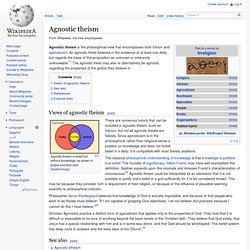
An agnostic theist believes in the existence of at least one deity, but regards the basis of this proposition as unknown or inherently unknowable.[1] The agnostic theist may also or alternatively be agnostic regarding the properties of the god(s) they believe in. Views of agnostic theism[edit] Agnostic theism is belief but without knowledge, as shown in purple and blue (see Epistemology). There are numerous beliefs that can be included in agnostic theism, such as fideism, but not all agnostic theists are fideists. Since agnosticism is in the philosophical rather than religious sense a position on knowledge and does not forbid belief in a deity, it is compatible with most theistic positions. Negative and positive atheism. A diagram showing the relationship between the definitions of weak/strong and implicit/explicit atheism.
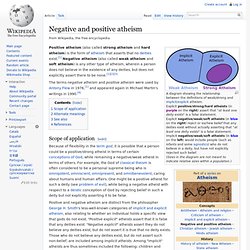
Explicit positive/strong/hard atheists (in purple on the right) assert that "at least one deity exists" is a false statement. Explicit negative/weak/soft atheists (in blue on the right) reject or eschew belief that any deities exist without actually asserting that "at least one deity exists" is a false statement. Implicit negative/weak/soft atheists (in blue on the left) would include people (such as infants and some agnostics) who do not believe in a deity, but have not explicitly rejected such belief. (Sizes in the diagram are not meant to indicate relative sizes within a population.) Secular humanism. The philosophy or life stance of secular humanism (alternatively known by some adherents as Humanism, specifically with a capital H to distinguish it from other forms of humanism) embraces human reason, ethics, and philosophical naturalism while specifically rejecting religious dogma, supernaturalism, pseudoscience, and superstition as the basis of morality and decision making.[1][2][3][4] The International Humanist and Ethical Union (IHEU) is the world union of more than one hundred Humanist, rationalist, irreligious, atheistic, Bright, secular, Ethical Culture, and freethought organizations in more than 40 countries.
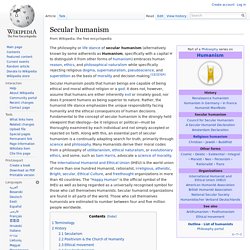
The "Happy Human" is the official symbol of the IHEU as well as being regarded as a universally recognised symbol for those who call themselves Humanists. Secular humanist organizations are found in all parts of the world. Those who call themselves humanists are estimated to number between four and five million people worldwide. Terminology[edit] History[edit] Omnipotence paradox. Atheism.
Atheism is, in a broad sense, the rejection of belief in the existence of deities.[1][2] In a narrower sense, atheism is specifically the position that there are no deities.[3][4][5] Most inclusively, atheism is the absence of belief that any deities exist.[4][5][6][7] Atheism is contrasted with theism,[8][9] which, in its most general form, is the belief that at least one deity exists.[9][10][11]
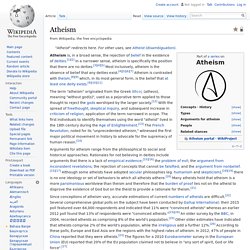
Atheist existentialism. Atheist existentialism or atheistic existentialism is a kind of existentialism which strongly diverged from the Christian works of Søren Kierkegaard and has developed within the context of an atheistic worldview.[1] Thought[edit] Atheistic existentialism confronts death anxiety without appealing to a hope of somehow being saved by a God (and often without any appeal to supernatural salvations like reincarnation).
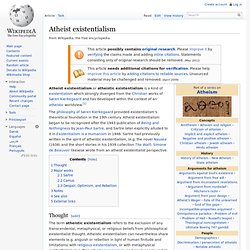
For some thinkers, existential malaise is mostly theoretical (as it is with Jean-Paul Sartre) while others are quite affected by an existentialistic anguish (an example being Albert Camus and his discussion of the Absurd). Sartre once said "existence precedes essence". What he meant was that, first of all, man exists (e.g. appears on the scene) and only afterwards defines himself.
Major works[edit] Biosophy. Biosophy, meaning wisdom of life, is a humanist movement heavily influenced by the 17th-century philosopher Baruch Spinoza.
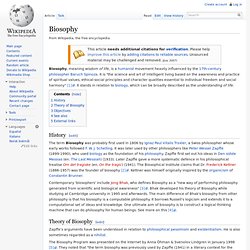
It is "the science and art of intelligent living based on the awareness and practice of spiritual values, ethical-social principles and character qualities essential to individual freedom and social harmony" [1]. It stands in relation to biology, which can be broadly described as the understanding of life. History[edit] The term Biosophy was probably first used in 1806 by Ignaz Paul Vitalis Troxler, a Swiss philosopher whose early works followed F. W. Contemporary 'biosophers' include Jong Bhak, who defines Biosophy as a "new way of performing philosophy generated from scientific and biological awareness" [3]. Secular humanism. List of atheists in politics and law. Abiogenesis. Scientific hypotheses about the origins of life can be divided into a number of categories.
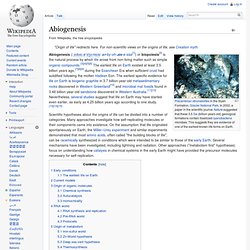
Many approaches investigate how self-replicating molecules or their components came into existence. On the assumption that life originated spontaneously on Earth, the Miller–Urey experiment and similar experiments demonstrated that most amino acids, often called "the building blocks of life", can be racemically synthesized in conditions which were intended to be similar to those of the early Earth. Several mechanisms have been investigated, including lightning and radiation. Other approaches ("metabolism first" hypotheses) focus on understanding how catalysis in chemical systems in the early Earth might have provided the precursor molecules necessary for self-replication. The True Word. The True Word (Discourse, Account, or Doctrine) (Λόγος Ἀληθής) is a treatise in which Celsus addressed many principal points of Early Christianity and refuted or argued against their validity.
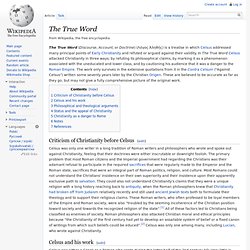
In The True Word Celsus attacked Christianity in three ways; by refuting its philosophical claims, by marking it as a phenomenon associated with the uneducated and lower class, and by cautioning his audience that it was a danger to the Roman Empire. The work only survives in the extensive quotations from it in the Contra Celsum ("Against Celsus") written some seventy years later by the Christian Origen.
These are believed to be accurate as far as they go, but may not give a fully comprehensive picture of the original work. Criticism of Christianity before Celsus[edit] Celsus was only one writer in a long tradition of Roman writers and philosophers who wrote and spoke out against Christianity, feeling that their doctrines were either inscrutable or downright foolish. The Enemies of Reason. The Enemies of Reason is a two-part television documentary, written and presented by evolutionary biologist Richard Dawkins, in which he seeks to expose "those areas of belief that exist without scientific proof, yet manage to hold the nation under their spell", including mediumship, acupuncture and psychokinesis.[1]
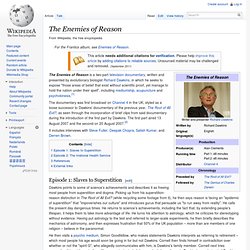
Skepticon. Skepticon is the largest skeptic and secular convention held in the United States.[1] It was co-founded by Missouri State University students Lauren Lane and JT Eberhard.
Guest speakers are invited to discuss atheism, skepticism, and other related topics. This free event is sponsored by the Missouri's Church of the Flying Spaghetti Monster, and is held on the campus of Missouri State University. Sign of the horns. A demonstration of the Sign of the Horns The sign of the horns is a hand gesture with a variety of meanings and uses in various cultures. It is formed by extending the index and little fingers while holding the middle and ring fingers down with the thumb. Superstition[edit] In Italy and some Mediterranean cultures, when confronted with unfortunate events, or simply when these events are mentioned, the sign of the horns may be given to ward off bad luck.
It is also used traditionally to counter or ward off the "evil eye" (malocchio). List of atheists in music. Ignosticism. Pharyngula (blog) Is God Dead? The issue drew heavy criticism, both from the broader public and from clergymen. Invisible Pink Unicorn. Jainism and non-creationism. Jainism does not support belief in a creator deity. According to Jain doctrine, the universe and its constituents—soul, matter, space, time, and principles of motion—have always existed. Atheist's Wager. One formulation of the Atheist's Wager suggests that one should live a good life without religion, since Martin writes that a loving and kind god would reward good deeds, and if no gods exist, a good person will leave behind a positive legacy.[1][2] The second formulation suggests that, instead of rewarding belief as in Pascal's wager, a god may reward disbelief, in which case one would risk losing infinite happiness by believing in a god unjustly, rather than disbelieving justly.[3]
Jean Meslier. Jean Meslier Jean Meslier (French: [melje]; also Mellier; 15 June 1664[1] – 17 June 1729), was a French Catholic priest (abbé) who was discovered, upon his death, to have written a book-length philosophical essay promoting atheism. Described by the author as his "testament" to his parishioners, the text denounces all religion. Russell's teapot.